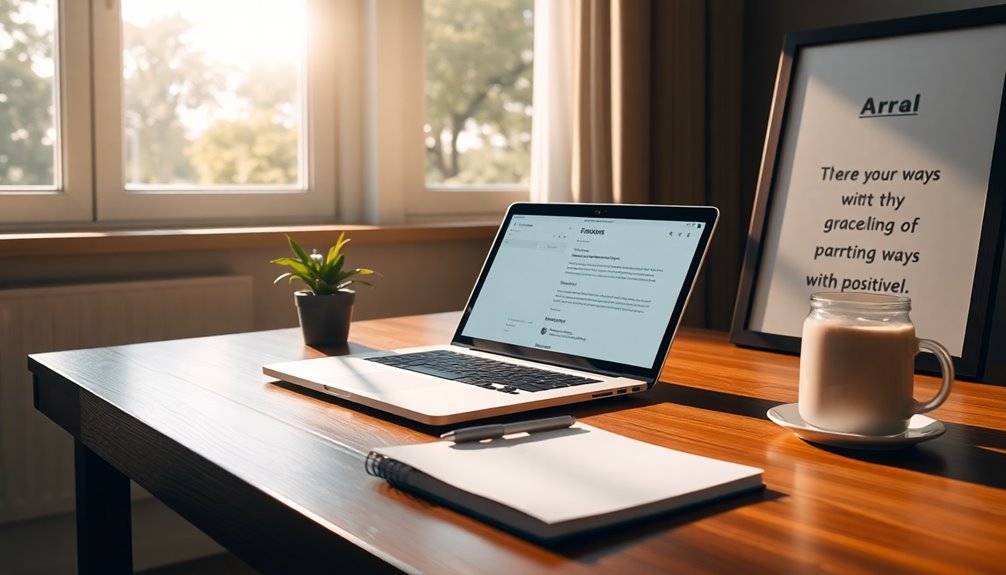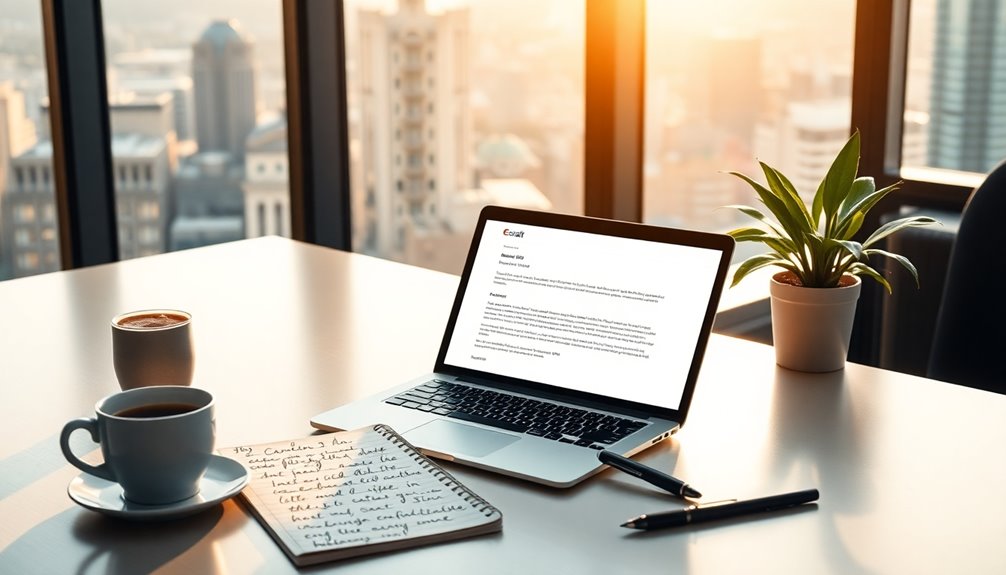To write a two-week notice email that ends on a good note, start with a clear subject line, like "Resignation – [Your Name]." Begin with a respectful greeting, then clearly state your resignation and last working day. Express gratitude for the opportunities and support you've received, and offer your help during the transition. Keep the tone positive, avoiding any negativity about the company or colleagues. A concise, professional email helps maintain relationships that could lead to future networking. For tips on structure and examples, don't miss out on the helpful insights that follow!
Key Takeaways
- Start with a clear subject line indicating your resignation to set a professional tone.
- Clearly state your last working day to avoid ambiguity and ensure a smooth transition.
- Express gratitude for opportunities and support received during your tenure, highlighting positive experiences.
- Offer assistance during the transition, such as training your replacement or documenting key tasks.
- Maintain a positive tone throughout, avoiding negative remarks and focusing on goodwill and future connections.
Introduction

Have you ever wondered how to leave a job on good terms? Writing a two-week notice email is essential for maintaining professionalism and ensuring you part ways positively. This email serves as a formal communication, notifying your employer of your intention to resign, typically delivered two weeks before your last working day.
It's a standard professional courtesy that can enhance your future networking opportunities.
When crafting your resignation email, start with a clear subject line, such as "Resignation – [Your Name]." A personalized greeting sets the tone, followed by a concise statement of your resignation.
Don't forget an expression of gratitude for the opportunities you've received during your time there. Offering to assist with the transition—like training a replacement or documenting processes—shows your commitment to the team's success.
End your email on a positive note by expressing appreciation and goodwill. This thoughtful approach not only reflects your professionalism but also leaves a lasting positive impression on your employer and colleagues.
Maintains Professional Relationships

Maintaining professional relationships is crucial when you decide to leave a job. Your resignation, delivered through a well-crafted two weeks notice email, showcases your professionalism and respect for your employer. By expressing gratitude in your message, you strengthen those bonds, paving the way for future networking opportunities. A positive tone throughout this process fosters goodwill, which 70% of employers appreciate when considering references.
During your transition, offer to assist with handing off your responsibilities. This not only helps your employer, but it also leaves a lasting impression on your colleagues, enhancing your professional relationships.
Following up with a farewell message to your team is another effective way to reinforce these connections. Remember, 85% of job opportunities arise through networking, so maintaining these ties is key.
Leaving on good terms can open doors for future collaborations or job prospects. By demonstrating your commitment to a smooth transition and expressing appreciation, you create a positive environment that benefits everyone involved.
Ultimately, it's about ensuring that you exit gracefully while keeping your professional network intact for whatever comes next.
Concise and Respectful Tone

Crafting a two-week notice email with a concise and respectful tone is key to leaving a positive impression. By keeping your message brief and professional, you ensure that your intention to resign is communicated clearly. A well-structured email, ideally one paragraph long, helps the recipient understand your message without unnecessary details.
Make sure to express gratitude for the opportunities you've had while working with the company. This fosters goodwill and maintains positive relationships with colleagues and supervisors, which can be invaluable for future networking. Avoid negative language or lengthy explanations about why you're leaving; this approach reflects positively on your character and keeps the focus on a respectful farewell.
Conclude your email with an offer to assist during the transition. This reinforces your commitment to a smooth transition and shows that you care about the team, even as you move on.
Step-by-Step Guide to Resignation Email

When you decide to resign, writing a clear and professional email is essential. Start with a clear subject line, like "Notice of Resignation," to indicate your intent. Address your supervisor with a professional greeting to set the right tone.
In your first sentence, state your intention to resign from your position, mentioning your last day of work, which should be at least two weeks from the date you send the email. This gives your employer adequate notice to begin the transition process.
Express gratitude for the opportunities and experiences you've gained during your time with the company. This fosters goodwill and helps maintain positive relationships. A simple statement like, "I appreciate the support I've received," can go a long way.
Offer your help during the transition period. You might say you're willing to train a replacement or document ongoing projects, which shows your commitment to a smooth handover.
Keep your email concise and maintain a positive tone throughout. Avoid negative comments or lengthy explanations about your reasons for leaving. This approach will ensure your resignation email is professional and well-received.
Dos and Don'ts for Resignation Emails

Writing a resignation email requires careful consideration of what to include and what to avoid to ensure a smooth transition. Start by keeping your email concise. Clearly state your intent to resign, mention your last working day, and express gratitude for the opportunities you've had. This helps maintain professionalism and leaves a positive impression.
Avoid including negative remarks about the company or your colleagues. Such comments can damage your professional reputation and future relationships. Instead, focus on the positive aspects of your experience.
Don't share detailed reasons for leaving or your future employment plans, as this can lead to unnecessary speculation.
Do offer assistance during the transition. This could involve training a replacement or documenting processes, demonstrating your commitment to a smooth handover.
Examples of Resignation Emails

Resignation emails should be clear and professional to ensure a smooth departure from your job. Start with a clear subject line, like "Notice of Resignation," to inform your manager immediately about your intent. In the opening, state that you're resigning and specify your last working day, which is typically two weeks from the date you send the email.
Next, express gratitude for the opportunities and experiences you've gained during your tenure. This not only fosters goodwill but also helps maintain positive relationships. You might say, "I truly appreciate the support and guidance I received while working here."
Additionally, offer assistance during the transition period. Whether it's training your replacement or documenting ongoing projects, showing your commitment to a smooth handover will reflect your professionalism.
Pro Tips for Writing Effective Emails

Effective email communication is crucial in professional settings, especially when it comes to important matters like resignations. When you're drafting your two weeks notice, keep the subject line clear and concise; using phrases like "Notice of Resignation" ensures immediate recognition of your email's purpose.
Start with a professional greeting and maintain a respectful tone throughout your resignation letter. Clearly state your intention to resign and specify your last working day, making sure it aligns with the company's notice policy. This clarity helps in managing expectations.
Don't forget to express gratitude for the opportunities and experiences you gained during your time at the company. This approach helps maintain positive relationships, which is essential for your professional network.
Additionally, offering assistance during the transition period can make a significant difference. Whether it's training a replacement or preparing documentation, showing your commitment to a smooth transition reflects well on you.
Final Thoughts

Leaving a job can be a significant step in your career journey, and how you approach your two-week notice email matters. Ending your message on a positive note helps preserve professional relationships, paving the way for future networking.
Expressing gratitude for the opportunities you've had during your tenure can leave a lasting impression on your employer and colleagues. Make sure to mention your final day of work clearly to avoid any confusion.
Alongside this, offer to train your replacement or assist in the transition period. This commitment to ensuring a smooth workflow after your departure reflects professionalism and respect for the team you're leaving behind.
In your farewell message, acknowledge the contributions of your colleagues, which fosters goodwill and may encourage their support in your future endeavors. Maintaining a respectful tone throughout your resignation email is essential for leaving a positive legacy within the organization. Additionally, establishing healthy boundaries during your transition can help you navigate the remaining time with clarity and respect.
Frequently Asked Questions
How Do You End a Two Week Notice Email?
To end your two-week notice email effectively, express gratitude for the experiences you've had and the opportunities you've been given.
Wish your team success in the future, reinforcing positive feelings.
Use a professional closing like "Sincerely" or "Best regards," followed by your name.
Consider offering to help during the transition or sharing a memorable moment with colleagues to leave a warm, lasting impression as you move on.
How Do You Write a Two Week Notice on Heartfelt?
When you write a heartfelt two-week notice, start with a warm greeting that shows appreciation for your time there.
Clearly state your resignation and last working day, keeping it professional.
Share genuine gratitude for the support and growth you've experienced.
Offer to help with the transition, whether it's training someone or sharing project details.
What Do You Say in an Email When Attached a Letter of Resignation?
When you attach a letter of resignation in an email, make sure to clearly state that you're providing formal notice.
Mention your last working day for clarity. Keep a professional tone, expressing gratitude for the experiences you've gained.
Offer to assist with the transition by training a replacement or documenting your tasks.
Use a straightforward subject line like "Resignation Notice" to ensure the purpose of your email is immediately clear.
Proofread for errors!
How to Write a Resignation Letter With a Buyout of Notice Period?
When you're writing a resignation letter with a buyout of your notice period, start by clearly stating your intention to resign and your proposed last working day.
Explain briefly why you're opting for the buyout, maintaining a positive tone.
Don't forget to express gratitude for the opportunities you've had and offer your assistance in the transition, showing your commitment to the team's success even as you depart early.









